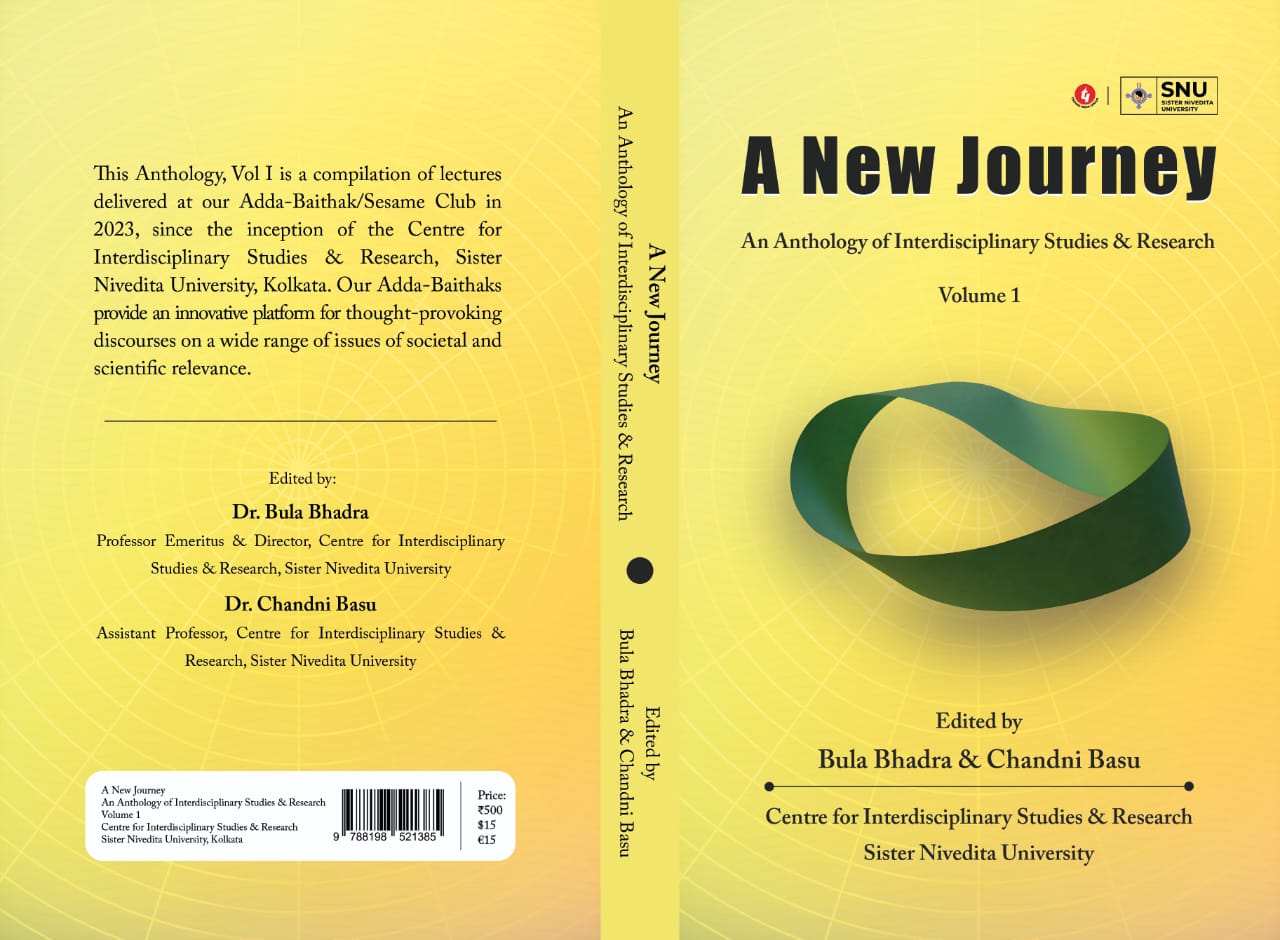CISRS
Centre for Interdisciplinary Studies and Research (CISRS)
Sister Nivedita University, Kolkata
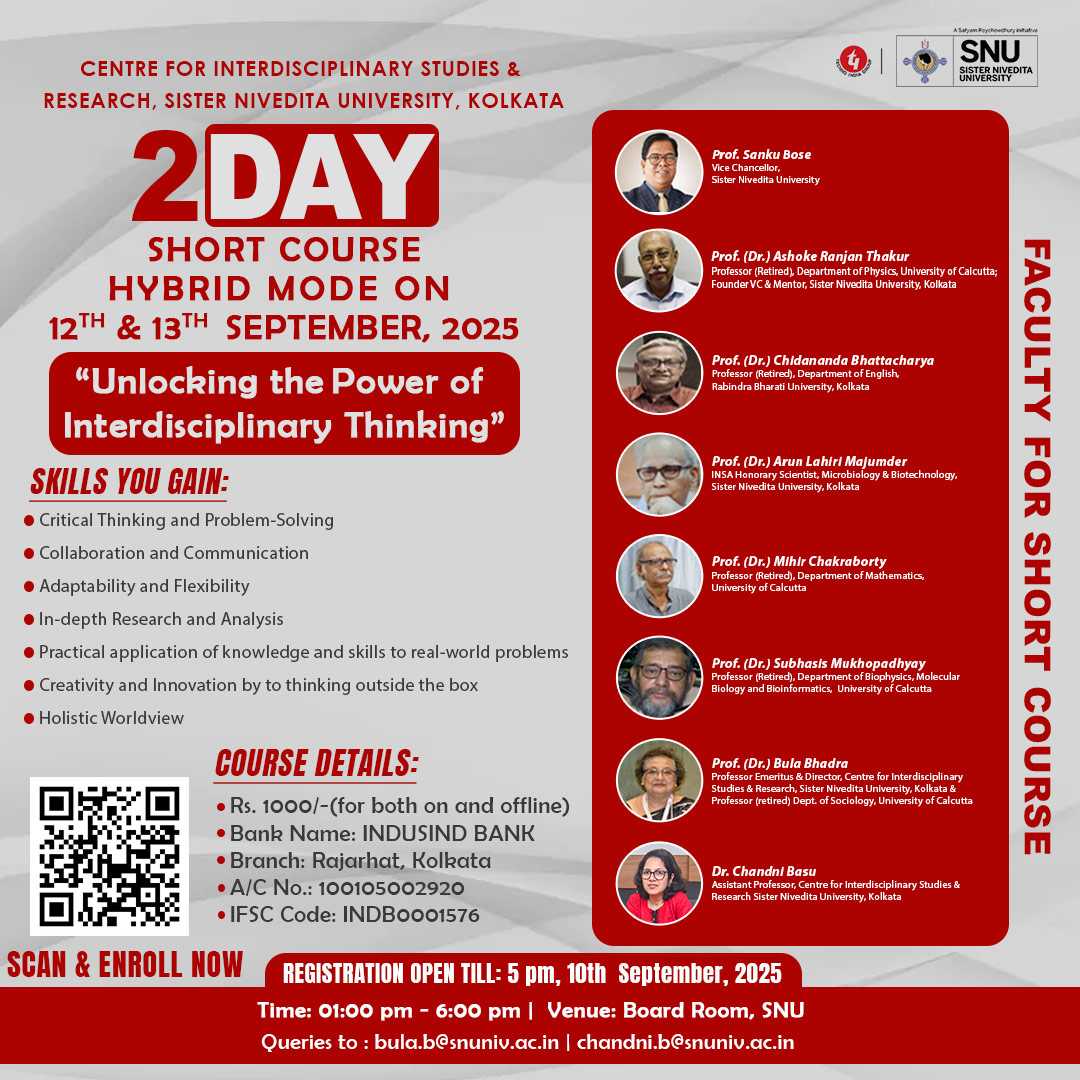
7th Two Day Short Course
Unlocking the Power of Interdisciplinary Thinking
Centre for Interdisciplinary Studies & Research in Social Sciences, Sister Nivedita University (SNU), Kolkata offers a 2 day short course on "Unlocking the Power of Interdisciplinary Thinking" on 12 & 13 September, 2025 for College, University Faculty, Research Scholars and Final year PG Students. Certificates will be provided to the participants on the successful completion of the course.
The Course will be offered 1pm - 6 pm in blended mode
Course Fee – Rs. 1000/-(for both on and offline)
Course fee to be deposited in the following account
Account Name: SISTER NIVEDITA UNIVERSITY
Bank Name : INDUSIND BANK
Branch : Rajarhat, Kolkata
Account NO. : 100105002920
IFSC Code : INDB0001576
Minimum/Maximum participants – 15/40
Queries to : bula.b@snuniv.ac.in, chandni.b@snuniv.ac.in
Registration open till : 5PM, 10th September 2025
Book published by Sister Nivedita University, 2025.
A NEW JOURNEY
An Anthology of Interdisciplinary Studies and Research
Edited by -
Prof. (Dr.) Bula Bhadra & Dr. Chandni Basu
“We are not students of some subject matter, but students of problems. And problems may cut right across the borders of any subject matter or discipline”.
Karl Popper (1902-1994) (one of the most influential philosopher of science in twentieth century)
In the face of the complex challenges the world has faced since the second half of twentieth century and in twenty first century, we require directions/solutions that transcend disciplinary boundaries. Interdisciplinarity has had, for some time already, a high priority for science policy and research funding. It is also an upcoming area in studies on knowledge production and circulation. Twenty-first century represents the post-disciplinary era. For example, gender studies and environmental studies, health studies are classic examples of this significant shift. Examples also include quantum information processing an amalgamation of quantum physics and computer science; and bioinformatics-combining molecular biology with computer science. Even if interdisciplinarity is widely accepted today, many still show distrust towards researches that depart from the status quo. The lack of guidelines and literature on how to perform interdisciplinary research greatly hinders the affirmation of this approach to social sciences.
Need for Interdisciplinary Studies and Research
To begin with, interdisciplinarity comes in different names, such as multidisciplinarity, pluridisciplinarity or cross-disciplinarity. Interdisciplinarity aims at identifying, structuring, analyzing and handling issues in problem fields with the following aspirations:-
- To grasp the relevant complexity of a problem.
- To take into account the diversity of life-world and scientific perceptions of problems.
- To link abstract and case-specific knowledge.
- To develop knowledge and practices that promote what is perceived to be common good.
Interdisciplinary research involves organization of knowledge around real world problems rather than disciplines itself. Since the world is interconnected, the problems are also indubitably interconnected. An interconnected world needs new forms and patterns of intellectual inquiry that challenges existing disciplinary and institutional boundaries. The collaboration across disciplines increases the likelihood that the proposed solutions will also be more effective than discipline-based solutions. Interdisciplinarity enhances creativity, and helps researchers to rethink their own discipline in new ways. There are various important but complex problems, phenomena and concepts that resist understanding or resolution when approached from single disciplines. Accordingly, interdisciplinarity is a form of research that transcends disciplinary boundaries to address and solve problems related to the life world. Interdisciplinarity generally refers to the appropriate combination of knowledge from many different specialities – especially to shed new light on an actual problem. It is a new field of research emerging in the ‘ knowledge society’, which links science and policy to address issues such as, uses and abuses of new technologies, digitization and its impact, public health policies, social changes in major structures (family, education, workplaces etc.), environmental degradation and others. Interdisciplinary research has grown in no small part due to the demand for this kind of approach by firms, organizations and policy-makers, especially after the 1970s. Research is becoming an integral component of innovation and problem solving strategies in the life world, affecting not only the private sector, public agencies, and civil society, but also
Mission & Vision of the Centre (CISRS)
The center seeks to become an international leader in the facilitation of interdisciplinary scholarship. We aim to develop relationships with funding sources that enable us to support projects on campus and in our community through grants and mentorship programs. We seek to create cutting-edge research and opportunities by connecting researchers from disparate fields and locations at SNU and beyond. Through a combination of technologies, we will provide interdisciplinary researchers at SNU with information resources, venues for promoting their work, and access to funding, opportunity to participate in conferences, and training opportunities. To empower students/scholars/faculty to create innovative academic pathways is a goal so that they become successful and adaptable leaders with a lasting impact on society.
Objectives of the Center
The major objective of the centre will be to forward a unifying approach that focuses on the world through a combination of related disciplines. The core principles of interdisciplinarity can be called a combination of three' Cs: Collaboration, Cooperation and Communication among disciplines in addressing a particular complex issue. One classic example for the centre could be gender studies, which might combine gender studies, history, literature, biology/physiology, sociology and media studies. Or, in case of public health, which might combine medicine, pharmacy, sociology, politics, and psychology. Another would be Science and Technology Studies (STS) which is an academic discipline in the social sciences that purports to analyze how society, politics and culture influence scientific research and technological innovation, and how these, in turn, affect society, politics and culture. STS scholars argue that one of its key strength is its interdisciplinary approach. STS has developed into a versatile and heterogeneous research field in recent years. One of the strengths of STS is its ability to travel between spheres, encourage conversation and enable novel gatherings of things and people. The very nature of the development process requires that the special skills and perspectives of the engineer, the physicist and the chemist be harmonized with those of the economist, the historian, the sociologist and the anthropologist. We hope that the centre will enlist the talents of natural and social scientists and technologists globally.
Proposed Programs of the Center
- Offering PhD Degree
- Refresher courses and Orientation programs for faculty
- Adda Baithaks /Sesame Club type free discussions and interactions on relevant interdisciplinary issues
- Short courses (for example UGC/ HRDC conduct short term courses of about two to six days duration in specialized areas for the professional development of faculty members)
- Summer and Winter schools/Refresher courses and Orientation programs
- Certificate courses
- Bringing projects of interdisciplinary nature funded by different types of organizations.
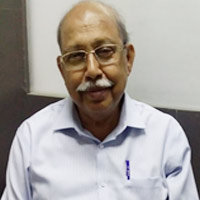
Prof. (Dr.) Ashok Ranjan Thakur, Mentor at Sister Nivedita University and Advisor to the Centre for Interdisciplinary Studies and Research
Prof. (Dr.) Thakur became Professor of Biophysics in 1995 in the University of Calcutta (CU) worked in area of theoretical and biochemical physics of structural Biology of DNA, molecular Biology of anaerobes. He also Set up Distributive Information Centre and was Director of Computer Centre setting up the information network of CU. He became Pro Vice Chancellor in Jadavpur University JU from March 1 2001 to 23rd Dec. 2003 and became VC of West Bengal University of Technology (WBUT, now MACAU) from Sept 2004 to May 20, 2008. He was also FOUNDER VC of West Bengal State University from May 21, 2008 to May 20, 2012. He was Founder Vice Chancellor of Techno India University, Kolkata from Sept 2012 to September 2015 and Founder Vice Chancellor of Sister Nivedita University (SNU) from June2018 to Dec.31, 2019 and has been a Mentor at SNU since then.
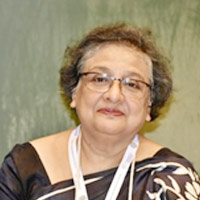
Email - bula.b@snuniv.ac.in
Prof. (Dr.) Bula Bhadra, is currently Professor Emeritus and Director of Centre of Interdisciplinary Studies and Research at Sister Nivedita University, New Town, Kolkata. She was an alumnus of Presidency College and University of Calcutta & did her M.A. & PhD from McMaster University, Canada where she taught for three years as Assistant Professor. She joined Dept of Sociology, University of Calcutta and taught for 28 years. Prof. Bhadra was a Visiting Professor in the Dept. of Humanities & Social Sciences, Indian Institute Engineering, Science and Technology, Shibpur, West Bengal, India from June 1 2017- May 31 2019. She joined as the Professor and Head of Dept. of Sociology at Sister Nivedita University, New Town in July 2019. Her research interest and areas of specialization includes Post-colonial theory, Sociology of gender, Sociology of childhood, and Sociology of Science and Technology. She has published extensively on Gender and Childhood, Gender and Technology nationally and internationally. She has published extensively on Gender and Childhood, Gender and Technology, Post-Colonial theory nationally and internationally. Her first book entitled Materialist Orientalism: Marx, ‘Asiatic’ Mode of Production and India and several of her articles are internationally accredited. She has written in both Vernacular and English. She has supervised 18 PhDs and 16 MPhil on Gender, Childhood, Police and Correctional Institution. She has been awarded several major and minor projects by UGC & ICSSR. Her last project was on “Micro Solar Dome: An affordable Lighting Solution for Slum Dwellers”, (A project of SEED, DST, Govt. of India) jointly with NBIRT, 2017-9. She is recipient of “Professor D. N. Mazumdar Memorial Gold Medal – 2017 as Distinguished Social Scientist by Indian Social Science Association in 2017. She is the Regional representative & Board Member of Research Committee (RC) 32 (2014-2018 &2018-22/23) and RC 53 (2014-18) & Secretary and Treasurer (2018-2022/23), International Sociological Association. She was also the Expert Memeber, Schemes of Science for Equity, Empowerment and Development (SEED) Division of Department of Science & Technology (DST, Govt. of India) in 2018-19 and she was a Managing Committee Meber of Indian Sociological Society from 2001-2007 and was the Founding Convenor, Research Committee on Sociology of Childhood and Youth, Indian Sociological Society (ISS), New Delhi, 2012-2017. She has been a visiting Professor in many Universities of India and Abroad and a resource person in a good number of Universities of India for UGC & ICSSR conducted Refresher, Orientation and Short Courses.
She is a Scholar-activist and combines her academic activities with grass-root outreach activities. She has been associated with Police training of Government of India, West Bengal Police and Kolkata Police; participated as Resource person in Parenting, Child Rights & Protection , Human Rights and Gender Sensitization training; also associated with Family Counselling in Legal Aid Services West Bengal (LASWEB), State Legal Services Authority, Government of West Bengal, State Audit Advisory Board (SAAB), West Bengal as experts in advisory capacity and also Govt. of Assam for training of counsellors in relation to Juvenile Justice (Care and Protection of Children) Act, 2000. She has been invited as specialist in enormous number of NGOs (e.g. CINI, Save the Children, Care India, Sanlap, Sanhita, Saroj Nalini, Country Women’s Association of India, Women’s Coordinating Council, Manas Bangla, Ganna Unnayan Parshad, Kolkata Nivedita Shakti, Dignity Foundation, SAHAY etc) who are engaged in uplift of women, children and marginalized/excluded sections of the people. Sher frequently participated in numerous talk shows in All India Radio, and in different TV channels and also contributed a large number of articles to All India English and Bengali dailies on current social issues and problems.
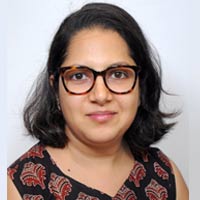
Dr. Chandni Basu is an Assistant Professor in the Centre for Interdisciplinary Studies and Research, Sister Nivedita University
Email - chandni.b@snuniv.ac.in
Dr. Basu completed her doctoral study at the Institute of Sociology, University of Freiburg, Germany in 2017. The study interrogated the juvenile justice mechanism in India. She was a Research Associate at the Department of Sociology, University of Frankfurt, Germany. Here she taught two courses on Childhood and Postcoloniality, Youth and Culture. She has also delivered lectures at University of Strasbourg, France; Leiden Law School, University of Leiden, Netherlands; Käte Hamburger Centre, 'Law as Culture', University of Bonn, Germany. She also participated in a mobility exchange programme at the Institute of Education, University of Zürich, Switzerland. She has been a Guest Faculty at the Department of Sociology, Rabindra Bharati University, Kolkata, India and taught two courses on Sociology of Crime and Deviance. Her current publications include a chapter in an edited volume Pandemic of Perspectives: Creative Re-imaginings (London: Routledge,2022). Dr. Basu has also worked on a children’s project in an asylum seekers camp in Germany. She has worked as an independent consultant with many NGOs in India since 2007 apart from engaging in an education project for marginalized children in Kolkata, India, 2005-07. Her research and teaching interests include Sociology of children and childhood, Sociology of Law, Marginality, Gender & Sexuality, knowledge circulation, inter-disciplinarity and intersectional Post –Colonial studies.







